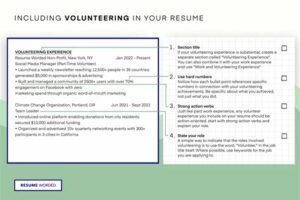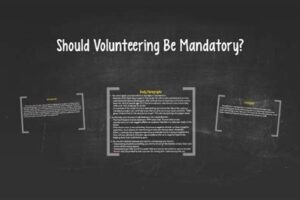Table of Contents
Learn the essential steps on how to write an effective email for volunteer work. Discover tips for crafting a compelling subject line, addressing the recipient, expressing your interest, highlighting relevant skills, and concluding professionally. Enhance your chances of getting involved in meaningful volunteer opportunities by mastering the art of writing impactful emails.
Are you passionate about making a difference in your community? Do you want to give back and contribute your skills and time to a worthy cause? Volunteering is a wonderful way to make a positive impact, and writing an email expressing your interest in volunteering is the first step towards creating that change. Crafting a well-written email can help you stand out from the crowd and show your professionalism and dedication. In this guide, we will provide you with valuable tips and guidelines on how to write an effective email for volunteer work, ensuring your message captures the reader’s attention and increases your chances of being selected for the opportunity.
Introduction
Volunteering is a noble act that allows individuals to give back to their communities and make a positive impact. Whether you are looking to volunteer for a local charity, non-profit organization, or community event, sending a well-written email can help you secure a volunteer opportunity. In this article, we will provide you with valuable tips on how to write an effective email for volunteer work.
Research the Organization
Prior to writing your email, it is essential to conduct thorough research on the organization you wish to volunteer for. Visit their website, read about their mission, goals, and ongoing projects. Understanding their values and initiatives will allow you to tailor your email to their specific needs and showcase your genuine interest in contributing to their cause.
Identify the Appropriate Contact
When reaching out for volunteer opportunities, it is crucial to identify the correct person to contact. Look for an email address or phone number of the volunteer coordinator, program manager, or someone responsible for recruitment. Addressing your email to the right individual demonstrates your attention to detail and professionalism.
Subject Line
Your subject line should be concise, yet compelling enough to grab the recipient’s attention. It should clearly indicate that you are interested in volunteering. For example, Enthusiastic Volunteer Interested in Contributing to [Organization’s Name]. A well-crafted subject line increases the chances of your email being opened and read.
Greeting and Introduction
Start your email with a courteous greeting, addressing the recipient by their name if possible. Begin by introducing yourself briefly and expressing your enthusiasm for the organization’s mission. This will immediately capture the reader’s attention and convey your genuine interest in volunteering.
Highlight Relevant Skills and Experience
In this section, emphasize any skills or experiences that make you a suitable candidate for the volunteer position. Mention any previous volunteer work, relevant courses, or certifications you have obtained. If you have a specific skill set that aligns with the organization’s needs, be sure to mention it here.
Express Your Availability and Commitment
Let the organization know your availability and the time commitment you are able to offer. Be clear about your preferred days or hours of volunteering. If you have any scheduling limitations or specific time frames in mind, mention them as well. Demonstrating your commitment and reliability will increase your chances of being considered for a volunteering opportunity.
Explain Your Motivation
Take a moment to explain why you are interested in volunteering for this particular organization. Share a personal story or experience that connects you to their cause. Express your passion and desire to contribute to their mission. This will show the recipient that you are genuinely invested in their work.
Ask Questions
Show your genuine interest and initiative by asking questions about the organization’s volunteer programs, specific projects, or any upcoming events they may have. This demonstrates your willingness to learn more and actively engage in their activities. It also provides an opportunity for the recipient to provide additional information that might not be readily available on their website.
Closing and Gratitude
End your email by expressing gratitude for the recipient’s time and consideration. Include your contact information and let them know you are available for further discussion or an interview if needed. Sign off with a professional closing, such as Sincerely or Best regards, followed by your full name.
Proofread and Send
Before hitting the send button, make sure to proofread your email for any spelling or grammatical errors. Read it aloud to ensure clarity and coherence. Once you are confident with the content, send your email and eagerly await a response.
In conclusion
Writing an email for volunteer work requires thoughtfulness, professionalism, and genuine interest in the organization’s cause. By conducting research, customizing your message, and showcasing your qualifications, you significantly increase your chances of securing a rewarding volunteer opportunity. Remember to always be polite, concise, and grateful throughout the email. Good luck with your volunteering endeavors!
How To Write an Email for Volunteer Work
When reaching out to an organization for volunteer work, it is crucial to craft an email that conveys your purpose effectively and captures the recipient’s attention. By following these guidelines, you can create a professional and compelling email that increases your chances of securing a volunteer opportunity.
Subject Line: Grab Attention with a Clear and Concise Subject Line
One of the first things recipients see when they receive an email is the subject line. Therefore, it is essential to make it clear, concise, and attention-grabbing. Use specific keywords that directly relate to the volunteer opportunity or project you are interested in. This will enable the recipient to understand the nature of your email and prioritize their response.
Greeting: Start with a Formal and Polite Salutation
Begin your email by addressing the recipient with a formal and polite salutation. Use phrases like Dear [Recipient’s Name], or Hello [Organization’s Name] Team. Proper greetings demonstrate professionalism, respect, and establish a positive tone for your email.
Introduction: Introduce Yourself and State Your Intentions
In the opening paragraph, introduce yourself briefly and explain why you are reaching out to the organization for volunteer work. Clearly state your intentions and specify the particular role or project you are interested in. Briefly highlight your relevant skills, experiences, or qualifications to demonstrate your suitability for the opportunity.
Research: Demonstrate Knowledge about the Organization
Show your interest and dedication by conducting prior research about the organization. In your email, mention specific programs, initiatives, or achievements of the organization that resonate with you. This demonstrates your genuine interest and passion for their cause and helps establish a connection with the recipient.
Availability: Clearly Specify Your Availability and Commitment
In the body of the email, clearly state your availability and desired commitment level for the volunteer work. Provide information on the number of hours you can dedicate per week, the duration of your availability, or any flexibility in your schedule. This upfront information helps the organization assess if your availability aligns with their needs.
Skills and Experience: Highlight Relevant Skills and Experience
In a separate paragraph, emphasize any relevant skills, experiences, or qualifications that make you an ideal candidate for the volunteer opportunity. Whether it be previous volunteer work, specific certifications, or transferable skills gained through work or education, highlight how these assets can contribute to the organization’s goals and enhance your ability to excel in the role.
Volunteering Interest: Express Your Interest and Enthusiasm
Demonstrate your genuine interest and enthusiasm for volunteering with the organization. Express your motivation to contribute towards their mission and make a positive impact. Briefly mention any personal connection or experiences that have inspired you to pursue this opportunity, emphasizing your dedication and commitment.
Closing: End with a Polite and Professional Closing Statement
Conclude your email with a polite and professional closing statement. Express gratitude for the recipient’s time and consideration, and provide your contact information for further correspondence. Sign off with an appropriate closing, such as Sincerely, or Best regards, followed by your name and relevant contact details.
By following these guidelines, you can write a well-crafted email for volunteer work that showcases your professionalism, enthusiasm, and suitability for the opportunity. Remember to proofread your email before sending it and ensure that your tone remains polite and respectful throughout the message. Good luck with your volunteer endeavors!
When it comes to writing an email for volunteer work, it is important to maintain a professional voice and tone throughout the message. This will help create a positive impression and increase the chances of getting a favorable response from the recipient. Here are some key points to keep in mind:
1. Start with a polite greeting:
- Begin your email by addressing the recipient with a formal salutation such as Dear [Name] or Hello [Name], followed by a comma.
2. Introduce yourself and your purpose:
- Briefly introduce yourself and mention why you are reaching out. Clearly state that you are interested in volunteering and explain your motivation behind wanting to contribute to their organization or cause.
3. Highlight relevant skills and experiences:
- Emphasize any skills or experiences you possess that are relevant to the volunteer work you are interested in. This will help the recipient understand how you can make a valuable contribution to their organization.
4. Express enthusiasm and willingness to learn:
- Show genuine enthusiasm for the opportunity to volunteer and express your willingness to learn and take on new challenges. This demonstrates your commitment and dedication to making a difference.
5. Inquire about available volunteer positions:
- Politely ask about any current or upcoming volunteer positions they have available. This shows your proactive approach and interest in getting involved.
6. Offer flexibility and availability:
- Mention your availability and offer flexibility in terms of time commitment. This allows the recipient to better assess if there are any suitable volunteer opportunities that align with your schedule.
7. Request a meeting or call:
- Suggest scheduling a meeting or a phone call to further discuss your interest in volunteering and explore potential opportunities. This personal touch can help establish a connection and increase the likelihood of being considered.
8. Express gratitude and provide contact information:
- End your email by expressing gratitude for their time and consideration. Also, provide your contact information, including your phone number and email address, so they can easily reach out to you.
9. Use a professional closing:
- Conclude your email with a professional closing, such as Sincerely, or Best regards, followed by your full name and any relevant titles or affiliations.
Remember, writing an email for volunteer work requires professionalism and a genuine interest in making a positive impact. By following these guidelines, you can effectively convey your intentions and increase your chances of securing a volunteer opportunity.
Thank you for taking the time to visit our blog and learn about how to write an email for volunteer work. We hope that the information provided has been helpful in guiding you through the process of crafting a professional and effective email. Remember, when reaching out to potential volunteer opportunities, it is essential to present yourself in a professional manner to make a lasting impression.
In conclusion, when writing an email for volunteer work, it is crucial to keep a professional tone throughout. Start by introducing yourself and expressing your interest in the organization or cause. Clearly state your skills, experience, and availability to demonstrate your suitability for the volunteer position. Use transition words such as furthermore and additionally to smoothly guide the reader through your email. Finally, conclude your email by expressing enthusiasm for the opportunity and providing contact information for further communication.
We hope that this article has equipped you with the necessary knowledge and skills to confidently write an email for volunteer work. By following the guidelines outlined, you will be able to effectively communicate your passion, skills, and availability to potential volunteer opportunities. Remember, a well-written email can make all the difference in securing a rewarding and fulfilling volunteer experience.
Thank you once again for visiting our blog. We encourage you to explore other articles on our website that provide valuable information and resources related to volunteering and making a positive impact in your community. We wish you the best of luck in your volunteer endeavors and hope that you find a rewarding opportunity that aligns with your interests and goals. Should you have any further questions or need additional assistance, please do not hesitate to reach out. Happy volunteering!
.
People also ask about how to write email for volunteer work:
What should I include in an email for volunteer work?
- Your introduction: Start by introducing yourself and expressing your interest in volunteering.
- The purpose: Clearly state why you are reaching out and the specific volunteer opportunity you are interested in.
- Your skills and qualifications: Highlight any relevant experience, skills, or qualifications that make you a suitable candidate for the volunteer position.
- Your availability: Specify the days and times you are available to volunteer.
- Contact information: Provide your phone number and email address so that the organization can easily reach you.
- A polite closing: Thank the recipient for their time and express your enthusiasm to contribute to their cause.
How do I format an email for volunteer work?
- Subject line: Use a concise and specific subject line that captures the essence of your email, such as Volunteer Inquiry or Interested in Volunteering.
- Greeting: Address the recipient with a polite salutation, such as Dear [Organization Name] Volunteer Coordinator.
- Paragraphs: Keep your email organized and easy to read by using short paragraphs and clear headings for different sections.
- Tone: Maintain a professional and enthusiastic tone throughout the email.
- Length: Keep your email concise and to the point, ideally no longer than one page.
- Signature: Close your email with a professional signature that includes your full name and contact information.
What should I avoid in an email for volunteer work?
- Grammatical and spelling errors: Proofread your email carefully to ensure it is free from mistakes.
- Overly casual language: Maintain a professional tone and avoid using slang or informal language.
- Being too vague: Clearly state your intentions and specify the volunteer opportunity you are interested in.
- Exaggerating or embellishing your qualifications: Be honest about your skills and experience.
- Attaching unnecessary documents: Unless specifically requested, avoid attaching extensive documents or resumes.
- Being impatient: Allow the organization some time to respond to your email before sending follow-ups.
When writing an email for volunteer work, it is important to include the following information:
When formatting an email for volunteer work, follow these guidelines:
When writing an email for volunteer work, avoid the following:






